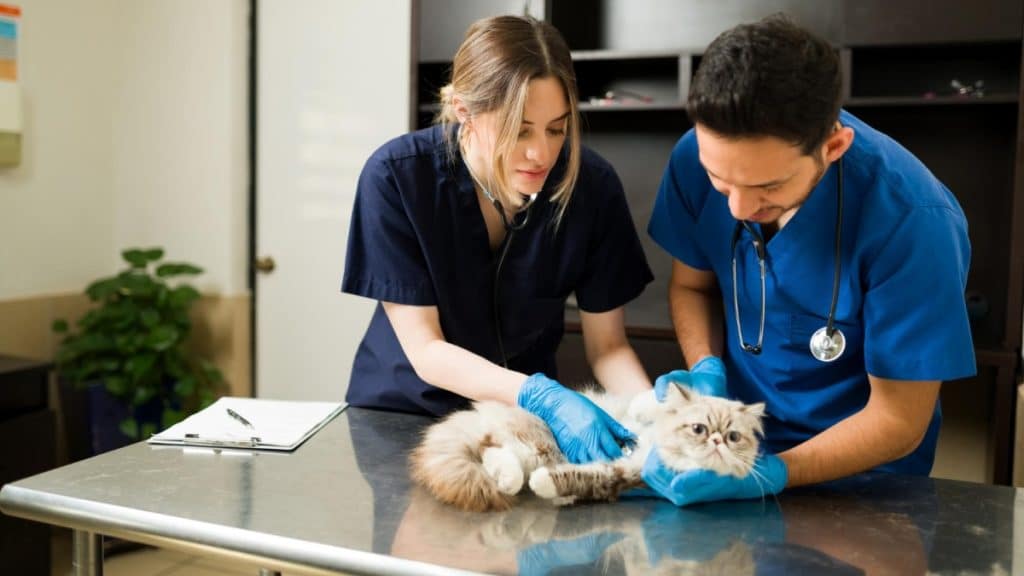A wise man said:
“ Every skill you acquire doubles your odds of success ”
To be successful as a veterinarian, you must master many different skills. Here are the most crucial.
Knowledge Of Veterinary Practices And Ethics.
There is a reason why this is the number one skill on our list:
The ability to understand and apply veterinary practice and the ethical standards of their profession is essential for veterinarians. It includes knowing how to diagnose diseases and injuries in animals, evaluate treatments and make recommendations for treatment plans, prescribe medications, use equipment such as x-rays, ultrasound, CT scans, or MRI machines, interpretation of medical records, and so on.
For example:
What types of anesthesia are appropriate when performing surgeries: which medications should be given before surgery starts vs. post-surgery medicines administered after completions?
Without this vital skill, it would be impossible to practice veterinary medicine in most cases:
Solid Foundation In Animal Handling
Animal handling skills are a must for veterinarians. Handling animals means that you need to be able to safely and effectively restrain them, keep them calm, assess their health and injury conditions, and provide medical treatment if needed.
Additionally, the Veterinarian also needs to have a solid understanding of the principles of animal behavior, so they can help patients during stressful times or when they may exhibit unusual behavior due to illness or injury. It means they should be able to understand what motivates an animal’s emotional state during an exam or procedure to detect any signs of pain or discomfort that could signal serious problems with the patient’s health and welfare.
Critical Thinking And Problem-Solving Skills
The ability to think critically, analyze situations, and identify solutions is an essential part of being a veterinarian. More so, as a veterinarian-unlike most other jobs, you will be required to think on your feet and apply sound judgment to solve problems.
Developing these skills can be challenging at first, but with practice, you will develop them naturally as you work through your clinical rotations or residency program.
You should also consider incorporating critical thinking into all aspects of your veterinary career: from diagnostic tests and treatments to managing patient care and communication with clients.
Interpersonal Skills
Yes, veterinarians are famous for treating animals and fighting diseases. But they also need to be good at working with people. They need to understand human nature, communicate effectively, and work with others.
Understanding of human nature: Veterinarians are constantly interfacing with clients, as well as care providers and animal owners who bring their pets in for treatment. Veterinarians must do this effectively and professionally, even when dealing with difficult situations requiring empathy and tact.
Communication skills: As a veterinarian working in animal clinics or hospitals, you will often interact with colleagues who specialize in different areas such as surgery or dentistry: this requires excellent communication skills so that everyone feels understood by each other despite having different specializations within their field (i.e,, one person might specialize in dermatology). In addition, since most veterinarians will spend more time interacting with clients, it’s important not only how well they explain what they do but also why they do it.
Working cooperatively towards shared objectives (Teamwork)
Veterinary medicine involves collaborating closely with other professionals such as medics/physicians (who provide medical care), veterinary assistants/technicians etc. This would require a person who can collaborate well within a team and work effectively with others.
Technology Expertise
Technology is a tool that veterinarians can use to improve animal care. They must be able to use technology in their practice and understand its benefits and limitations.
Gone are the days of old-school veterinary medicine. In today’s world, a veterinarian needs to be comfortable with technology and be able to use it to improve patient care.
Veterinarians need to have:
Working knowledge of the use of specialized technologies: This includes Digital radiology (e.g X Rays, CTscans), telemedicine, e-prescribing, electronic medical records and electronic health records (EHRs).
Here’s why this skill is essential:
With up-to-date technology, veterinarians and their staff members are no longer bound by the limitations of outdated practices.
With the help of modern technology, veterinarians and their staff can effortlessly handle appointments, patient records, and finances while delivering exceptional care to our beloved pets. But that’s not all: by embracing and mastering the latest technology in your practice, you can distinguish yourself from similar competitors who lack these advancements. This enticing advantage will attract clients and make them more likely to choose your practice for their pet’s needs. And if eventually, you decide to sell your vet practice in the future it will get you more value for your veterinary clinic compared to a similar practice that doesn’t have it.
Management And Organizational Skills
Management and organizational skills are vital for veterinarians who have a practice.
The veterinary field requires a lot of hard work and dedication, so you need to be able to organize your time, personnel, and finances and be efficient to succeed in your career.
In addition, they need to establish goals and objectives they can work toward with their team members. Veterinarians must also be able to delegate tasks to others and take additional responsibilities when needed.
In the end, they need to be able to manage the daily operations of their business, including hiring employers, planning for long-term strategies, and ensuring that all aspects of the practice run smoothly.
Wrapping Up
To summarize: Veterinarians need to know how to make animals feel comfortable and keep them that way, learn a lot of new stuff/technologies quickly and be flexible in what they do. Veterinarians also need to handle stress well, work well with others, be ethical, and have good decision-making skills.
